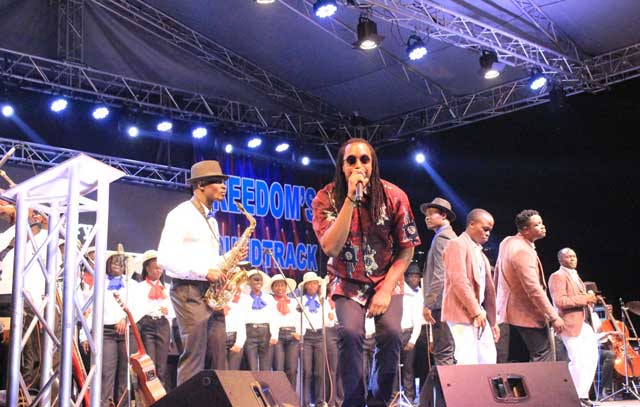
Kampala, Uganda | THE INDEPENDENT | Youthful crowds at Makerere University were on Thursday night thrilled by performances to commemorate the Black History Month, an annual celebration of achievements by African Americans and the central role of blacks in the history of the United States.
In what was dubbed the “Freedom Soundtrack” concert, Ugandan artists and students of performing arts at Makerere University performed songs from the 1800s up through 2014 during the symbolic month.
It featured music spanning three centuries, to remember their non-violence and activism efforts towards the liberation of America from Slavery through the Civil Rights era and to the present day.
Artists Sauti Ya Africa, sensational recording artist and dancer Sheebah Karungi, musical diva Rema Namakula and Ugandan rapper Daniel Lubwama Kigozi alias Navio all sang the freedom songs. They were accompanied by American musician Seth Sharp and Makerere University’s Department of Performing Arts and Film Choir.
“Every February, the United States celebrates Black History Month. This is a time for us to recognize the legacy of slavery and honour the achievements and contributions of African Americans throughout our history.
This year, the U.S. Mission organised a concert to celebrate the music that inspired not only African Americans but also the entire world, for generations,” says Christopher Krafft U.S. Mission Uganda Chargé d’affaires
The performances that kicked off at 6:00 pm on Thursday at the University Freedom Square showcased to the audience with an evolution in music, from early African American spirituals such as “Go Down Moses,” “Change is gonna come” to songs of the Civil Rights era of the 1950s and 60s, and all the way to the song “Glory” from the 2014 film Selma.
The U.S. mission in Uganda officials says the music performed during the concert helped the African Americans to find hope and escape bondage and played a key role in ending slavery.
“It also inspired African-Americans in their movement to gain equal rights under the law in the 1950s and 60s and it continues to uplift us today,” says Krafft.
The concert’s official poster flagged a photo of Dr Martin Luther King Junior, known throughout the world for his example of non-violent activism and his efforts to achieve equal rights for African-Americans.
“These messages of non-violence are important for United States, Uganda, and indeed the world, and resound as powerfully today as they did decades ago,” adds Krafft.
All Ugandan artists stuck to singing the revolutionary songs of Americans’ liberation struggles despite the calls from the audiences to sing their local songs.
********
URN
 The Independent Uganda: You get the Truth we Pay the Price
The Independent Uganda: You get the Truth we Pay the Price





